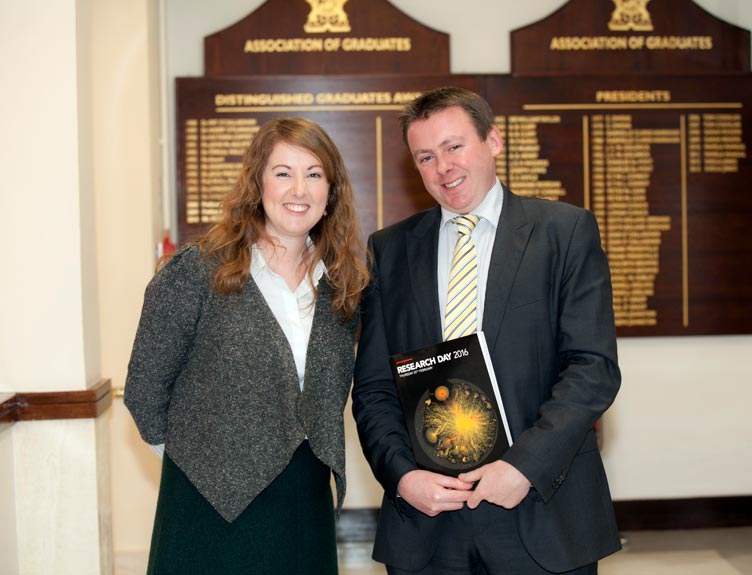Human heart valve grown in lab among innovations presented at RCSI Research Day 2016

RCSI scientists have made a breakthrough in heart research by growing a fully functioning heart valve in the lab that has the potential to work effectively within a growing human body.
This is the first time researchers have successfully made a valve capable of functioning for prolonged periods and adapting to the growing body. It will potentially eliminate the need for children with defective valves to undergo repeat surgeries. The research is among the innovations being presented at RCSI Research Day 2016, which takes place today at RCSI (Royal College of Surgeons in Ireland). The research was carried out by Claire Brougham, a PhD student at the Tissue Engineering Research Group in the Department of Anatomy at RCSI and Lecturer at DIT.
Professor Fergal O'Brien, Head of the Tissue Engineering Research Group (TERG) at RCSI and Principal Investigator on the project said: "Up to now, the problem with tissue engineered heart valves developed in the lab is that they did not shut properly. We developed a biomaterial in the lab from collagen and fibrin materials found in the body- constructed it into an anatomically correct heart valve shape and conditioned it for a number of weeks as if it was in a living heart, using a bioreactor. While further investigation is needed, we are very excited about these results and the impact that this could have on the cardiovascular field and the potential to improve patients' lives."
The research was the result of a multi-disciplinary effort between scientists and engineers in the TERG, which is part of the SFI-funded Advanced Materials and Bioengineering Research (AMBER) Centre, in collaboration with a clinical team led by Professor Stefan Jockenhoevel from RWTH Aachen University, Germany. The project was funded by the Irish Heart Foundation and European Research Council.
The John J Ryan Distinguished Lecture at RCSI Research Day 2016 will be delivered by Professor Steve Jackson, University of Cambridge Professor of Biology, Head of Cancer Research UK Laboratories at the Gurdon Institute, and Associate Faculty member at the Wellcome Trust Sanger Institute. His pioneering academic research has provided scientists with many of the key principles by which cells respond to and repair DNA damage and he will address the delegates on the topic ‘Cellular responses to DNA damage: from molecular insights to new cancer treatments’.
RCSI's annual Research Day provides scientists with the opportunity to showcase their most recent research findings. The latest advances in biomedical sciences, clinical research, population health sciences, healthcare delivery and health professions education are just some of the topics featured in studies which will be presented today to more than 300 researchers who are expected to attend.
Professor Ray Stallings, Director of Research at RCSI said: "RCSI's annual Research Day is a vital platform for highlighting the scope of research and innovation taking place across the different disciplines in the College, particularly amongst young researchers. We are committed to nurturing world-class research that can translate into treatments and benefits for patients and society, beginning at undergraduate level right up to the highest-calibre research-active academic staff. We are delighted to welcome Professor Steve Jackson to share his renowned expertise as a world-leading innovator in cancer research with us and to inspire our researchers early in their careers."
The emphasis for RCSI Research Day is on research presentations by investigators early in their career, post-doctoral fellows, post-graduate and undergraduate scholars and academic staff. All oral presentations and poster presentations will be judged and awards will be presented at a ceremony later this evening.



